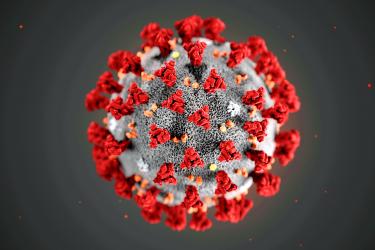Humans likely synthesized COVID-19, although more studies are needed to be certain, National Taiwan University (NTU) public health researcher Fang Chi-tai (方啟泰) said yesterday.
Fang made the statement during a disease-prevention education seminar held at NTU by the Taiwan Public Health Association.
The association invited several public health study professors and researchers to give presentations, which were broadcast live via Facebook.
During his presentation, Fang addressed numerous hypotheses that have been raised by foreign researchers, including the possibility that the virus was leaked from the Wuhan Institute of Virology.
He has heard of many US and Europe-based researchers who are asserting that the virus was inextricably linked to the institute, Fang said, adding that this assertion was highly possible as the facility’s biosafety level 4 laboratory houses samples of SARS, Ebola and other deadly viruses.
Given China’s poor track record with lab safety management and overall lab culture, it is highly likely that a virus escaped from the facility, he said.
Analyses of COVID-19 have shown that is has a 96 percent genetic similarity with an RaTG13 bat virus at the institute, he said.
While viruses need to be at least 99 percent similar to call them “the same,” it is the differences in particular that have led researchers to speculate that COVID-19 was manufactured by modifying RaTG13, he said.
A French research team that examined the gene sequence of COVID-19 has discovered that it has four more amino acids than other coronaviruses, he said, adding that this makes its transmission easier.
The findings have led some in the research community to speculate about whether China’s scientists intended to develop a virus more difficult to contain than SARS, he said.
If that was their intent, they appeared to have succeeded, Fang added.
Mutations of viruses that occur naturally only result in small, singular changes, he said, adding that one would not normally see a naturally mutated virus suddenly take on four amino acids.
While such a large mutation is not impossible, it is highly unlikely, he said.
However, only an internal administrative review at the institute could rule out whether the virus was manufactured there, he said.
Such an investigation would require access to lab records, which is unlikely to happen in the short term, he added.
Determining the source of the coronavirus has important implications for epidemiology, Fang said, adding that if the virus does not occur in nature, then it is likely to be entirely stamped out.
This is quite different from forms of influenza, which cannot be easily eradicated, because they are part of the ecosystem, Fang added.
Source: Taipei Times - 2020/02/23





















